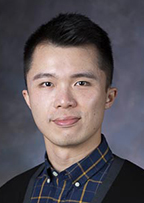Member Spotlight: Marco Leung

- What is your name?
Marco L. Leung
- What is your professional title?
Clinical Director – Institute for Genomic Medicine, Nationwide Children’s Hospital
Assistant Professor – Departments of Pathology and Pediatrics, The Ohio State University College of Medicine - What do you do for your career? How would you describe your role?
In short, my primary role as a Clinical Laboratory Director is to interpret, report and deliver genomic data results to ordering providers.
In addition to my clinical service, I also spend significant amount of time in research, which involves understanding and improving the diagnostic and clinical utilities of genomic testing for inherited diseases and cancers. Using clinical data from consented patients, we use genomic tools to discover novel gene/disease associations for rare diseases. On the education front, I am the Associate Director for our ACGME-accredited Laboratory Genetics and Genomics (LGG) Fellowship. I organize a weekly multi-institution LGG fellow’s conference, where we cover a broad range of medical genetics topics.
I also contribute a lot of my time to various committee duties to multiple professional organizations, including AMP, where I am the current Chair of the DEI Working Group.
- What degree(s) and/or training did you receive to achieve your position?
2010- BS in Molecular Genetics at The University of Texas MD Anderson Cancer Center
2016 - PhD in Biomedical Sciences at The University of Texas MD Anderson Cancer Center
2018 - Molecular Genetics & Genomics Fellowship– American Board of Medical Genetics and Genomics (ABMGG) - How did you decide to enter the field/What (or who) brought you into the field?
When I was a kid, I was fascinated with the forensics crime TV shows, which led me to study biology in college. During college, I found out about the ABMGG fellowship, which was the reason why I went to graduate school. I was fortunate to have a PhD advisor who supported me to pursue this career by funding me to the genetic conferences for networking.
- Who or what inspires you?
I am inspired by my mentors and my colleagues who are more advanced in their careers. I am always intrigued by their paths to success, and that motivates me to work harder in hopes to achieve their levels of success someday.
- How does your work help patients?
Genomic testing is useful in providing diagnoses, prognoses, and treatment options for patients and families. My job is to provide the most accurate, precise, and timely genomic results, with the goal to improve patient outcome.
- In your opinion, what are the most valuable aspects of AMP membership?
I particularly enjoy attending the AMP annual meetings where I can learn the latest genomic advancements. Also, the face-to-face connections with my colleagues are perhaps the most important part of these annual meetings - I would get caught up with my peers on our latest research projects and latest testing methodologies. And more often than not, I would leave the meetings with several new collaboration projects set up.
- What committee are you currently on and what motivated you to volunteer for an AMP committee?
I am currently the chair for the AMP Diversity Equity Inclusion (DEI) Working Group. Our working group believes that the molecular pathology field is best served by having diverse voices in our community and including representation from across the spectrum of our community in everything we do.
- What do you enjoy most about being a part of an AMP committee?
I enjoy planning and working on various engagement events and projects with my fellow working group members, who share the same passion in promoting DEI at AMP, and in our field.
- What’s your advice to early career/trainee/new AMP members?
My advice is to be involved in the volunteer, committee, and project opportunities (as much as time permits), and learn from their peers. Being involved in these committees and projects can foster better relationships between colleagues, which would potentially turn to collaborations for future projects and manuscripts. Being involved in committees has expanded my professional network beyond my own institution.

















